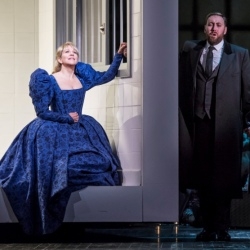Maria Stuarda (Royal Opera House)
I don’t get it. Audiences cheered when Howard Davies pitted a period-attired Charles I against the modern-dress political establishment in Howard Brenton’s play 55 Days, but when directors Moshe Leiser and Patrice Caurier pull the same trick for the Royal Opera in Donizetti’s Maria Stuarda it’s a red rag to the boo-boys. Were the loudmouths miffed because it’s a second-hand stunt? I doubt it; but they really ought to get out more.

© Bill Cooper
Only moments earlier the same faction had cheered Joyce DiDonato to the Covent Garden rafters, so they should be chastened by their heroine’s subsequent tweet: "People need to understand that great performances are aided by great direction". Quite. Move on.
With the Scottish independence vote looming this is a canny time to revive this operatic nod to our shared history, albeit one filtered through Germano-Italian eyes. Not that there’s much beef in Maria Stuarda, for in turning Schiller’s drama of confrontation into an opera Donizetti knocked the political stuffing out of it. We’re left with clash of monarchical egos where English petulance (Elisabetta I) triumphs over Scottish pride. That scarcely matters, though, because this is a cracking score that we ought to hear more often.
As a showcase for two divas it’s hard to beat, too, although Leiser & Caurier’s light-opera credentials get the better of them late in act one as the battle royal, with its history-bending encounter of the Queens, descends into a bun-chucking catfight worthy of Blackadder. A chair, as so often when opera directors run short of ideas, is duly thrown across the floor.
DiDonato’s miraculous mezzo has never sounded better than here. The voice, blest by the merest hint of a vibrato flutter, unfurls like petals in the sun with dynamics that arise naturally from her complete identification with words and music. She is partnered magnificently through large swathes of the second act by Matthew Rose, a home-grown bass of international distinction, who portrays Talbot as a man of steadfast loyalty, heartbroken by his inability to save his Queen.
While Maria languishes in a very modern dungeon, Carmen Giannattasio‘s Elisabetta is trapped inside a prison of her own: an outsized farthingale carapace whence, like the position to which she was born, there is no escape. While Giannattasio’s glassily secure upper register proved the ideal foil for DiDonato’s warmth, her Leicester, the Spanish tenor Ismael Jordi, was less versatile. He produced an attractive ringing sound but interpretational subtlety was at a premium and his tuning grew shaky during chromatic runs.
Secondary roles were effectively filled by Jeremy Carpenter (Cecil) and Kathleen Wilkinson (Anna), while Peter Dineen‘s silent, whisky-toping Executioner provided a shuddering reminder of the mess that was made during the actual beheading of Mary, Queen of Scots.
Bertrand de Billy showed once again that he is one of the best operatic conductors working today, with tempo choices and a stage-pit balance that never strayed from the ideal. The ROH Orchestra, well-versed of course in Italian repertoire under Antonio Pappano’s guidance, responded to his baton with verve and commitment.
As for the production itself, there really wasn’t that much to complain about. It did its job without getting in the way and provided an unfussy backdrop to the human drama. The directors’ and designer Christian Fenouillat‘s only substantial misjudgement was in physically separating Maria from her supporters during the execution scene, a decision that diminished the visual impact of its extraordinary epic prayer, a sweeping lament of Verdian dolour that wrenches the heart.










